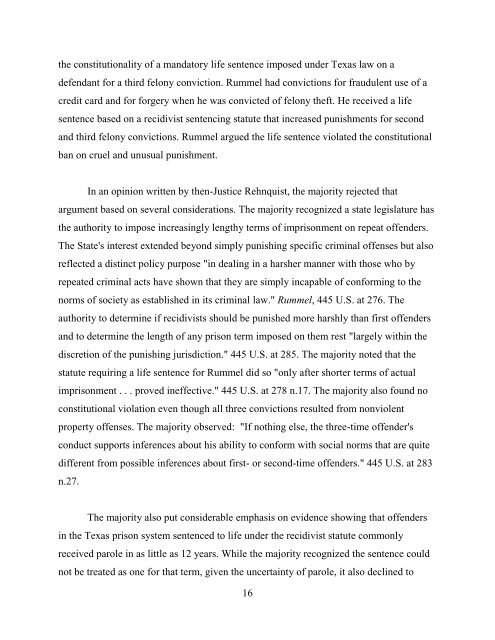State v. Proctor - Kansas Judicial Branch
State v. Proctor - Kansas Judicial Branch
State v. Proctor - Kansas Judicial Branch
You also want an ePaper? Increase the reach of your titles
YUMPU automatically turns print PDFs into web optimized ePapers that Google loves.
the constitutionality of a mandatory life sentence imposed under Texas law on a<br />
defendant for a third felony conviction. Rummel had convictions for fraudulent use of a<br />
credit card and for forgery when he was convicted of felony theft. He received a life<br />
sentence based on a recidivist sentencing statute that increased punishments for second<br />
and third felony convictions. Rummel argued the life sentence violated the constitutional<br />
ban on cruel and unusual punishment.<br />
In an opinion written by then-Justice Rehnquist, the majority rejected that<br />
argument based on several considerations. The majority recognized a state legislature has<br />
the authority to impose increasingly lengthy terms of imprisonment on repeat offenders.<br />
The <strong>State</strong>'s interest extended beyond simply punishing specific criminal offenses but also<br />
reflected a distinct policy purpose "in dealing in a harsher manner with those who by<br />
repeated criminal acts have shown that they are simply incapable of conforming to the<br />
norms of society as established in its criminal law." Rummel, 445 U.S. at 276. The<br />
authority to determine if recidivists should be punished more harshly than first offenders<br />
and to determine the length of any prison term imposed on them rest "largely within the<br />
discretion of the punishing jurisdiction." 445 U.S. at 285. The majority noted that the<br />
statute requiring a life sentence for Rummel did so "only after shorter terms of actual<br />
imprisonment . . . proved ineffective." 445 U.S. at 278 n.17. The majority also found no<br />
constitutional violation even though all three convictions resulted from nonviolent<br />
property offenses. The majority observed: "If nothing else, the three-time offender's<br />
conduct supports inferences about his ability to conform with social norms that are quite<br />
different from possible inferences about first- or second-time offenders." 445 U.S. at 283<br />
n.27.<br />
The majority also put considerable emphasis on evidence showing that offenders<br />
in the Texas prison system sentenced to life under the recidivist statute commonly<br />
received parole in as little as 12 years. While the majority recognized the sentence could<br />
not be treated as one for that term, given the uncertainty of parole, it also declined to<br />
16

















